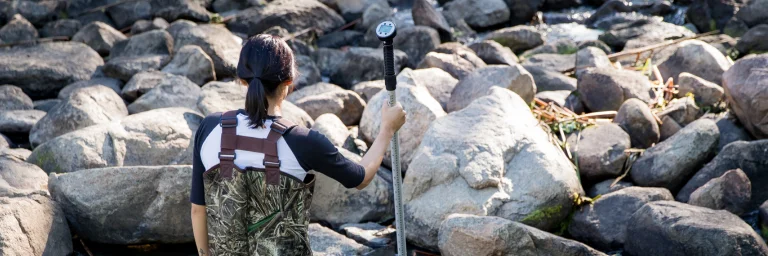Ph.D. in Environmental Engineering
Protect the environment while building the economy. Study at North Dakota's premier Energy University.
North Dakota's vast energy resources can play a critical role in easing the nation's energy dependence. Our graduates play a big part in ensuring these resources are acquired responsibly and sustainably.
- Program type:
- Doctoral Degree
- Format:
- On Campus or Online
- Est. time to complete:
- Up to 7 years
- Credit hours:
- 90
Why earn a Ph.D. in environmental engineering?
Ph.D. Programs in Environmental Engineering
-
Develop energy technologies that are economically competitive, reliable, sustainable and politically and environmentally acceptable.
-
Faculty have relationships with a wide variety of industries, municipalities, consulting firms, government agencies and research-funding organizations. This provides opportunities for your own research and collaboration.
-
Participate in ongoing research opportunities at the Energy & Environmental Research Center (EERC). It works with state, federal and industry clients to solve energy and environmental needs.
-
Gain access to on-campus EPA-certified laboratory facilities. These include the multi-disciplinary Environmental Analytical Research Laboratory, Civil Engineering Environmental and Hydraulics Laboratories, and Chemical Engineering Laboratories.
-
Flexible research options allow online students to choose projects relevant to their current job.
-
As a Ph.D. candidate, you'll complete an oral exam, present an annual progress report outlining your research, and defend a dissertation.
What to do with a Ph.D. in environmental engineering?
Environmental engineers play a key role in protecting air, water and soil quality and providing solutions to remediate impacts from emissions sources. Environmental engineering Ph.D. graduates will be prepared for careers in government, academia, or industries including:
- Recycling: Lead initiatives in sustainable waste management. You’ll develop innovative strategies to optimize recycling processes and reduce environmental impact.
- Waste Disposal: Design and manage efficient waste disposal facilities. You’ll leverage advanced techniques to address complex challenges associated with landfill management, hazardous waste disposal, and waste-to-energy conversion.
- Water and Air Pollution Control: Be at the forefront of safeguarding our natural resources. You’ll develop and implement sophisticated technologies to monitor and mitigate pollution sources. Whether designing water treatment plants or air quality control systems, you’ll play a pivotal role in preserving ecosystems, public health, and regulatory compliance.
- Pipeline Operations: Contribute to the safe and sustainable transport of resources. From oil and gas pipelines to water and sewage systems, you’ll ensure the integrity of infrastructure while minimizing ecological disturbances and potential risks.
- Data Science: Leverage your expertise to analyze vast datasets. You’ll employ advanced statistical models and machine learning algorithms to extract valuable insights, inform decision-making processes, and enhance environmental monitoring strategies.
- Consulting: Become a trusted advisors for businesses, government agencies, and non-profit organizations. You’ll provide strategic guidance on sustainable practices, regulatory compliance, and environmental impact assessments.
